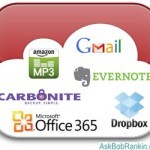
7 Free Cloud Services Worth Trying
By Bob Rankin
Cloud computing is a simple, versatile concept. Just turn over your data and software needs to the experts up there in “the cloud” of the Internet. Let them worry about storing your data, keeping it secure, organizing it, and maintaining software that lets you manage it. Check out these seven different types of cloud services…
Get Your Head in the Cloud
Cloud services can simplify your digital life, and most of them offer free options. If you don’t enjoy installing and maintaining software, or you’re sometimes frustrated that the information you want is only available on the computer back at your home or office, then you’ll benefit by using the cloud.
What can the cloud do for you? How about access to your email or music collection from ANY computer or mobile device? Or creating documents and spreadsheets, without having to buy expensive “office” software? Wouldn’t you like to have all your documents at your fingertips, and be certain they’re backed up and safe from fire, flood, viruses and hard drive crashes?
All you need is the right Internet-enabled device (desktop, laptop, tablet or smartphone) to play or work wherever you are. Here’s an introduction to cloud services that you can try:
#1 Email was one of the first big things to migrate to the cloud. Instead of downloading all of your email from a remote server and managing it with an email client, all you need now is a Web browser. Google’s Gmail, Hotmail (now Outlook.com), and Yahoo Mail are three major names in this Webmail game. All but the puniest ISPs provide some sort of Webmail interface to their email servers. See my article Why You Should Dump Outlook for a list of the benefits that webmail offers over desktop email software.
#2 When it comes to work, there are several cloud-based office productivity services available. The best known one is probably Google Docs, followed by Microsoft Office 365. Zoho is another major player. These cloud services let you create Office-compatible word processor, spreadsheet, and presentation documents. You can access them from anywhere, and collaborate on them with colleagues.
#3 Music is migrating to the cloud, making your favorite tunes available for listening on computers, phones, Internet jukeboxes, and home entertainment centers. What music lover doesn’t have iTunes, Pandora, Google Play, Amazon Cloud Player, or some other streaming music service based in the cloud? Music services sell you one song at a time instead of making you buy a whole album. You don’t need CD towers to store your tunes, specialized music players, or bulky carrying cases to take them with you. See Amazon Cloud Player for more info about cloud-based music services.
Excerpt shared with permission from Bob Rankin.




